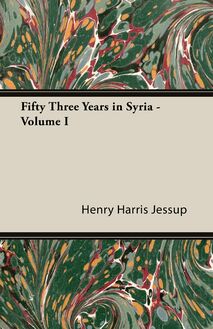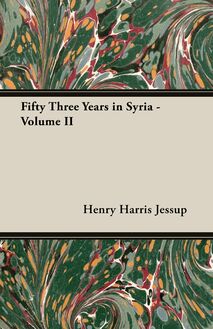Fifty Three Years in Syria - Volume I , livre ebook
254
pages
English
Ebooks
2020
Vous pourrez modifier la taille du texte de cet ouvrage
Obtenez un accès à la bibliothèque pour le consulter en ligne En savoir plus
Découvre YouScribe en t'inscrivant gratuitement
Découvre YouScribe en t'inscrivant gratuitement
254
pages
English
Ebooks
2020
Vous pourrez modifier la taille du texte de cet ouvrage
Obtenez un accès à la bibliothèque pour le consulter en ligne En savoir plus
Publié par
Date de parution
06 août 2020
Nombre de lectures
2
EAN13
9781528760065
Langue
English
Poids de l'ouvrage
1 Mo
Publié par
Date de parution
06 août 2020
Nombre de lectures
2
EAN13
9781528760065
Langue
English
Poids de l'ouvrage
1 Mo
Fifty-Three Years In Syria
By
HENRY HARRIS JESSUP, D. D.
Introduction by James S. Dennis, D. D .
IN TWO VOLUMES
VOLUME I
HON. WILLIAM JESSUP
AMANDA H. JESSUP
Dedicated to the Memory of
my revered father, Hon. William Jessup, LL. D., and my beloved mother, Amanda Harris Jessup: by whose godly example, wise counsel, and fervent prayers, I was led to Christ in my early boyhood; who helped me on my Christian course and to learn the luxury of doing good, and cheerfully gave me and my brother Samuel to the missionary work, at a time when a journey to Syria seemed like an act of self-immolation. :: :: :: :: I have tried to follow their example, and pray that my children and grandchildren may all prove worthy of such an ancestry .
The memory of the just is blessed .
Introduction
T HE author of this volume is one of the pioneers of the new historic era and the changing social order in the Nearer East. He is entitled to this distinction not because of direct political activity, or of any strenuous r le as a social reformer, but because of those fifty-three years of missionary service in the interests of religious uplift, educational progress, social morality, and all those civilizing influences which now by general consent are recognized results of the missionary enterprise.
It is a chronicle of eventful years in the history of Western Asia. It is necessarily largely personal, as the book is a combination of autobiographical reminiscence with a somewhat detailed record of mission progress in Syria. No one can fail to be impressed with the variety and continuity, as well as the large beneficence of a life service such as is herein reviewed. In versatile and responsible toil, in fidelity to his high commission, in diligence in the use of opportunity, in unwavering loyalty to the call of missionary duty, his career has been worthy of the admiration and affectionate regard of the Church. The writer of this introduction regards it as one of the privileges of his missionary service in Syria that for twenty-two of the fifty-three years which the record covers he was a colleague of the author, and that such a delightful intimacy has marked a lifelong friendship.
Dr. Jessup has been a living witness of one of the most vivid and dramatic national transformations which the world s annals record, as well as himself a contributor, indirectly and unconsciously perhaps, yet no less truly and forcefully, to changes as romantic, weird, and startling as the stage of history presents. We seem to be in the enchanted atmosphere of politics after the order of the Arabian Nights. In fact, no tale of the Thousand and One Nights can surpass in imaginative power, mystical import, and amazing significance, this story of the transportation of an entire empire, as if upon some magic carpet of breathless flight, from the domain of irresponsible tyranny to the realm of constitutional government. The cruel and shocking episode of massacre in transit seems to be in keeping with the ruthless barbarity of the despotic environment.
The author has presented his readers with a chapter of church history, which resembles a modern version of the annals of the great Reformation, and at the same time has a significant bearing upon the contemporary status of Christianity where it impinges upon Islam. The early fathers wrote of the opening struggles of Christianity with an overshadowing and hostile heathen environment. Modern historians have told us of the great conflicts with the corrupt and unsavoury medi valism of the Reformation era. Now in our day has come the turn of the later fathers of this missionary era, who are giving us a voluminous record of the world-embracing conflicts of present-day Christianity with the great dominant religions of the non-Christian world. Such volumes as Cary s History of Christianity in Japan, Richter s History of Missions in India, Warneck s Outline of a History of Protestant Missions, Stock s History of the Church Missionary Society, and the Records of the China Centenary Conference at Shanghai, with many others that might be mentioned, already form the later chronicles of a triumphant advance, which is no doubt finally to claim a world-wide victory.
The author s record is limited of course to one storm-centre of the foreign mission field. The story as he recounts it in page after page of his book is full to overflowing with rapid movement and crowded detail, but his fund of anecdote and incident constantly enlivens what readers unfamiliar with missionary history in Syria might find lacking in personal interest to them. His reminiscences of distinguished visitors and travellers, his genial records of social hours, or of touring companionships, his wealth of judicious and vigorous comment upon questions of missionary policy and practice, his unflinching characterization of fraud, corruption, and hierarchical assumption, his frequent allusion to the light which the land and its customs throw upon the Bible, his sketches of social etiquette and every-day life a generation or more ago, before the modernization of Syria began, are all valuable features of the narrative.
There are other aspects which no reader will fail to note, and which give a lively interest to the contents of the volume. His chronicles of persecution, spoliation, civil war, and massacre, which have so often marked the religious and political turmoils of the Asiatic Levant, his flashlights upon the confused religious entanglements of the Nearer Orient, his descriptive glimpses of the natural features and the physical phenomena, as well as the flora and fauna, of lands famous in literature and history, his references to men and women prominent in the tragic drama of civil and religious strife, as, for example, his story of Abd el Kadir, are illustrative of the variety which marks the subject matter.
His annals of church growth and organization in Syria, and the touching and often deeply stirring accounts of the experiences of individual converts, some of whom were martyrs, and all of whom passed through spiritual struggles, or endured cruel mockings and harassing persecutions, lend a living interest to the record. His report of educational progress-marvellous and beyond all expectation in the case of such an institution as the Syrian Protestant College at Beirut, his chronicles of literary toil and scholarly achievements in Bible translation, as well as in a broad range of literature issued by the American Mission Press, his tribute to the untiring and unstinted services of medical missionaries in Syria, of whom the lamented Dr. George E. Post was such a brilliant example, all add a historical and personal value to this story of unwavering consecration in one of the difficult and faith-testing mission fields of the world.
The record he gives of the sacrificial lives of eminent and devout men and women who have rendered noble service to Christ s kingdom in Western Asia should be sacred to the modern Church. In these days of phenomenal missionary advance, when converts in many fields are counted by the thousands, and when such elaborate and vigorous organized support is given to the cause of missions, there is much that is wholesome and instructive in the study of such a chapter as that upon The Seven Pioneers of the Syria Mission, which recounts the struggles and toils of those remarkable men who faced the difficulties and perils of those early days. Let us not forget or ignore amid the missionary successes of the present those nights of toil which tried the faith and taxed the fortitude of the toilers. We are sure that Dr. Jessup s volume will meet with a sympathetic welcome among hosts of friends. That it will command also the attention of students of the East, as well as of that portion of the Christian public, now rapidly increasing, who are interested in missions, we have every reason to believe.
J AMES S. D ENNIS .
In Memoriam
Since the above Introduction was written the chronicle of Dr. Jessup s busy and useful life has come to its final chapter. He died in Beirut, April 28, 1910. Many appreciative notices have appeared in the public press, and his death has been widely recognized as the passing of a loyal and consecrated soul to the realm of its higher service. It is a gratification to his friends that he lived to complete this, his final task, and also that he survived long enough to know something of the welcome accorded to his captivating volumes, and the sympathetic and admiring response they have awakened in many hearts.
J. S. D.
Prefatory Note
o o o
Unprofitable servants. - Luke 17 : 10
A NOTHER book? and that an autobiography? An Arabic scholar recently died in Cairo who was a poet, grammarian and editor, and who painted his own portrait by looking in a mirror.
Through the importunity of many friends, some of them my children, and some in official position, I was persuaded to undertake a sketch of my life and times, especially my now fifty-three years of missionary service, and thus paint my own portrait. In an unthinking moment I consented, and during the past four years I have had to live over my whole life of seventy-seven years and my Syrian life of fifty-three years, until I am tired of my story and myself. A man true to himself can get little comfort from unrolling the musty scroll of seventy-seven years in order to find out what he has been seeing, thinking, and doing all this time.
My autobiography is one thing; the history of the Syria Mission is quite another. To weave the two into one tends to magnify the one and to minify the other. I have become weary of seeing and writing I.
Having kept a pocket diary since 1855, and having copied all important letters in my letter copy-books of which I have thirty volumes of 500 pages each, the tax on my memory ha

